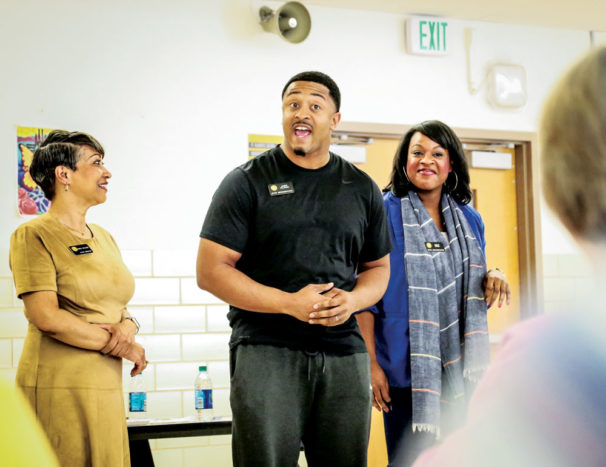
State Representative James Coleman responds to a constituent at a joint townhall held with State Senator Angela Williams (left) and Rep. Leslie Herod.
In a sign of the times, a town hall meeting held by State Reps. James Coleman and Leslie Herod and State Sen. Angela Williams had to be relocated from the Whittier Café to a larger space at Manual High School.
Close to 100 people from diverse backgrounds attended the meeting to learn about the state budget process, proposed bills, and to have an open conversation with the elected representatives, whose districts include Park Hill, Stapleton, Montclair and Mayfair, among other areas.
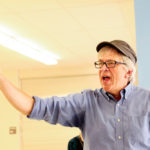
Jeff Neuman-Lee asks the representatives, “Why would we want to fund the rich?”
Also participating was State Sen. Dominick Moreno, who represents District 21 (north Metro Denver) and sits on the State Senate Budget Committee. Sen. Moreno gave an overview of the Senate’s proposed 2017-18 budget of $26.8 billion. The bill, which seeks to fill a shortfall of $400 million, includes cuts of $50 million in education and deep cuts to hospitals, with the precise amount still in debate. If passed, this budget will bring the underfunding of Colorado schools to almost $880 million, an accrual that has built up over the last decade or so.
The proposed budget eliminates TABOR refunds for 2018, but there will be modest salary increases to state employees, judges and elected officials, and some additional money for youth jails and child welfare under the budget bill.
Moreno answered questions from the audience, noting that tapping marijuana tax revenue to fund programs like schools or roads would not be effective, as it is just a “drop in the bucket” compared to other revenue sources.
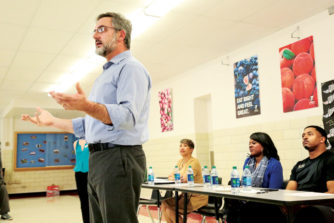
Andy Karsian of CDOT presented information about a bill to increase the state sales tax to fund road and traffic improvements. Current gas tax funding has not been increased since 1992.
Restrictions by TABOR and the Gallagher amendments are largely responsible for the tight budget that Colorado faces, even in boom times.
Andy Karsian of CDOT presented information about HB 1242, which seeks an increase of less than a penny on the dollar in state sales tax to fund road and traffic improvements. Garcia, noting that the gas tax in Colorado has not been raised since 1992, told the audience that they currently only have funding to do minimal maintenance on the roads. “How would it feel if you hadn’t had a raise in 25 years?” he asked.
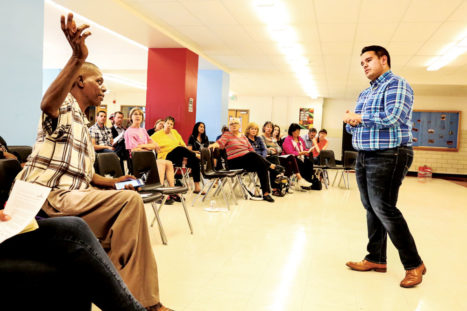
State Sen. Dominick Moreno, who represents District 21 (north Metro Denver), is a member of the State Senate Budget Committee. He explained issues about the Colorado budget at the town hall.
Many in attendance were concerned about the I-70 viaduct project that is slated to begin in early 2018. Rep. Herod and her colleagues made it clear that, while there is little that can be done about projects that are currently funded, concerned citizens should weigh in on current and future bills. “It’s coming to you. You can vote it up or down.”
As a means for people to get more involved, the representatives offered many different avenues. Sen. Williams described a community advisory cabinet that people can join on her website, while Rep. Herod described how she uses Twitter as well as Facebook Live to keep in touch with constituents. Rep. Coleman invited attendees to join a task force he is creating. All of them urged people to continue to make their voices heard. “Tell us what to do … We know people want more direct democracy,” said Rep. Coleman.
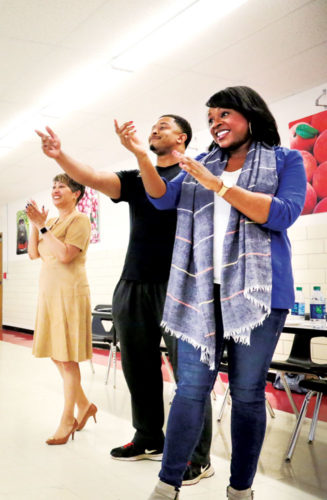
State Senator Williams (left) and Representatives Coleman and Herod thank the crowd for attending.




0 Comments